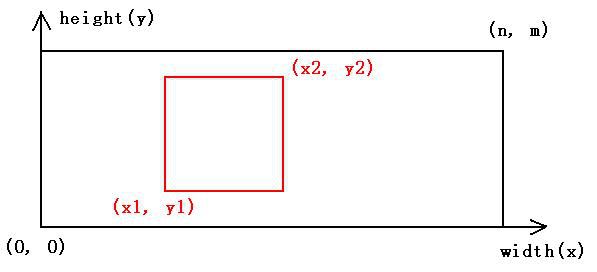ZOJ 3209 Treasure Map (Dancing Links)
Your boss once had got many copies of a treasure map. Unfortunately, all the copies are now broken to many rectangular pieces, and what make it worse, he has lost some of the pieces. Luckily, it is possible to figure out the position of each piece in the original map. Now the boss asks you, the talent programmer, to make a complete treasure map with these pieces. You need to make only one complete map and it is not necessary to use all the pieces. But remember, pieces are not allowed to overlap with each other (See sample 2).
Input
The first line of the input contains an integer T (T <= 500), indicating the number of cases.
For each case, the first line contains three integers n m p (1 <= n, m <= 30, 1 <= p <= 500), the width and the height of the map, and the number of pieces. Then p lines follow, each consists of four integers x1 y1 x2 y2 (0 <= x1 < x2 <= n, 0 <= y1 < y2 <= m), where (x1, y1) is the coordinate of the lower-left corner of the rectangular piece, and (x2, y2) is the coordinate of the upper-right corner in the original map.
Cases are separated by one blank line.

Output
If you can make a complete map with these pieces, output the least number of pieces you need to achieve this. If it is impossible to make one complete map, just output -1.
Sample Input
3 5 5 1 0 0 5 5 5 5 2 0 0 3 5 2 0 5 5 30 30 5 0 0 30 10 0 10 30 20 0 20 30 30 0 0 15 30 15 0 30 30
Sample Output
1 -1 2
Hint
For sample 1, the only piece is a complete map.
For sample 2, the two pieces may overlap with each other, so you can not make a complete treasure map.
For sample 3, you can make a map by either use the first 3 pieces or the last 2 pieces, and the latter approach one needs less pieces.
Author: HANG, Hang
Source: The 6th Zhejiang Provincial Collegiate Programming Contest
题目链接:http://acm.zju.edu.cn/onlinejudge/showProblem.do?problemId=3372
就是简单的精确覆盖问题。
把每个格子当成一个列,要覆盖所有格子。
写一下Dancing Links模板就可以了
1 /* *********************************************** 2 Author :kuangbin 3 Created Time :2014/5/26 21:50:46 4 File Name :E:\2014ACM\专题学习\DLX\ZOJ3209.cpp 5 ************************************************ */ 6 7 #include <stdio.h> 8 #include <string.h> 9 #include <iostream> 10 #include <algorithm> 11 #include <vector> 12 #include <queue> 13 #include <set> 14 #include <map> 15 #include <string> 16 #include <math.h> 17 #include <stdlib.h> 18 #include <time.h> 19 using namespace std; 20 const int maxnode = 500010; 21 const int MaxM = 1010; 22 const int MaxN = 510; 23 struct DLX 24 { 25 int n,m,size; 26 int U[maxnode],D[maxnode],R[maxnode],L[maxnode],Row[maxnode],Col[maxnode]; 27 int H[MaxN],S[MaxM]; 28 int ansd; 29 void init(int _n,int _m) 30 { 31 n = _n; 32 m = _m; 33 for(int i = 0;i <= m;i++) 34 { 35 S[i] = 0; 36 U[i] = D[i] = i; 37 L[i] = i-1; 38 R[i] = i+1; 39 } 40 R[m] = 0; L[0] = m; 41 size = m; 42 for(int i = 1;i <= n;i++) 43 H[i] = -1; 44 } 45 void Link(int r,int c) 46 { 47 ++S[Col[++size]=c]; 48 Row[size] = r; 49 D[size] = D[c]; 50 U[D[c]] = size; 51 U[size] = c; 52 D[c] = size; 53 if(H[r] < 0)H[r] = L[size] = R[size] = size; 54 else 55 { 56 R[size] = R[H[r]]; 57 L[R[H[r]]] = size; 58 L[size] = H[r]; 59 R[H[r]] = size; 60 } 61 } 62 void remove(int c) 63 { 64 L[R[c]] = L[c]; R[L[c]] = R[c]; 65 for(int i = D[c];i != c;i = D[i]) 66 for(int j = R[i];j != i;j = R[j]) 67 { 68 U[D[j]] = U[j]; 69 D[U[j]] = D[j]; 70 --S[Col[j]]; 71 } 72 } 73 void resume(int c) 74 { 75 for(int i = U[c];i != c;i = U[i]) 76 for(int j = L[i];j != i;j = L[j]) 77 ++S[Col[U[D[j]]=D[U[j]]=j]]; 78 L[R[c]] = R[L[c]] = c; 79 } 80 void Dance(int d) 81 { 82 //剪枝下 83 if(ansd != -1 && ansd <= d)return; 84 if(R[0] == 0) 85 { 86 if(ansd == -1)ansd = d; 87 else if(d < ansd)ansd = d; 88 return; 89 } 90 int c = R[0]; 91 for(int i = R[0];i != 0;i = R[i]) 92 if(S[i] < S[c]) 93 c = i; 94 remove(c); 95 for(int i = D[c];i != c;i = D[i]) 96 { 97 for(int j = R[i];j != i;j = R[j])remove(Col[j]); 98 Dance(d+1); 99 for(int j = L[i];j != i;j = L[j])resume(Col[j]); 100 } 101 resume(c); 102 } 103 }; 104 DLX g; 105 106 int main() 107 { 108 //freopen("in.txt","r",stdin); 109 //freopen("out.txt","w",stdout); 110 int T; 111 int n,m,p; 112 scanf("%d",&T); 113 while(T--) 114 { 115 scanf("%d%d%d",&n,&m,&p); 116 g.init(p,n*m); 117 int x1,y1,x2,y2; 118 for(int k = 1;k <= p;k++) 119 { 120 scanf("%d%d%d%d",&x1,&y1,&x2,&y2); 121 for(int i = x1+1;i <= x2;i++) 122 for(int j = y1+1;j <= y2;j++) 123 g.Link(k,j + (i-1)*m); 124 } 125 g.ansd = -1; 126 g.Dance(0); 127 printf("%d\n",g.ansd); 128 } 129 return 0; 130 }